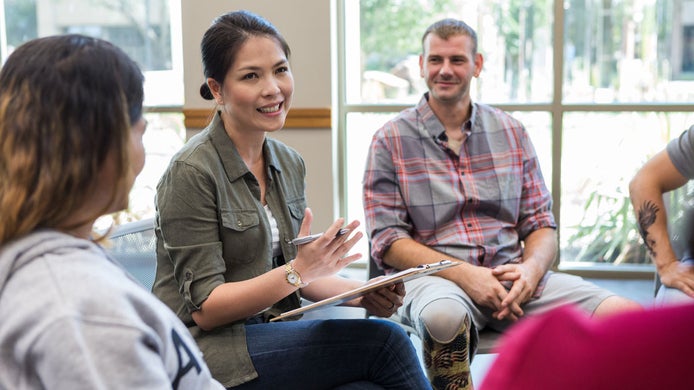Explore our resources for psychology and counseling degrees and learn about career options that fit your future.

Traditional education can sometimes create barriers that make learning more challenging for neurodivergent students. Graduate school in a clinical field can feel intimidating for these students, especially when so much of the field has historically focused on labeling differences as disorders.
In UMass Global's Marriage and Family Therapy (MFT) and Professional Clinical Counseling (PCC) programs (taken individually or as a dual degree), we see things differently. We are aware that the old paradigm, the medical model that requires diagnoses and pathologizes differences, is still a significant part of how our profession operates. You will most certainly need to learn the process of diagnosis, as licensure boards, insurance companies, and clinical documentation require it. But we also believe in an affirming paradigm: the neurodiversity movement, which recognizes brain-based differences as natural human variation and values the strengths and perspectives neurodivergent people bring.
Here’s what that means for students in our program:
- We affirm who they are. Students don’t have to mask or hide their neurodivergence here. We believe every lived experience is an asset to the training process and to the future of the field.
- We support how everyone learns. Our faculty is neurodiverse and we understand that students learn in different ways.
- We prepare students for both worlds. Our students graduate with the confidence to navigate the systems that still require traditional diagnosis, while also embodying and promoting neuroaffirming approaches in clinical work.
- We build community. Being surrounded by peers and faculty who respect and celebrate neurodivergence can make all the difference.
Our goal is simple: to help each student thrive, succeed as a professional, and carry forward the work of building a mental health field that honors every kind of human.
Our fully online MFT and PCC programs are designed to help every learner excel. Many of our students identify as neurodivergent, and they bring along amazing strengths such as pattern recognition, sustained focus on their areas of passion, and creative problem-solving. Below we share a bit more about common barriers our neurodivergent students may face, how we structure our courses, and the different supports we offer across both our synchronous and asynchronous courses.
Neurodiversity-Affirming Course Structure
Courses are designed with different methods of engagement and a variety of assignment types. Classes typically have a weekly two-hour synchronous video conferencing meetings, along with some kind of assignment for students to complete. These assignments vary from quizzes and written assignments (academic papers) to discussion board engagements and uploading video recordings.
We build courses with diverse learning opportunities, which means we offer multiple avenues to engage, understand, and demonstrate learning — ensuring expectations are transparent for all students, accounting for all types of learning.
UMass Global's Approach to Supporting Neurodivergent Student Success
- The Challenge: Sharing ideas out loud in class can trigger social anxiety — especially when tackling complex material.
The Solution: UMass Global fosters an inclusive classroom culture by inviting students to communicate with instructors about their needs. We offer alternative ways to participate, such as chat responses, shared slides, or written submissions, so every learner can feel empowered to contribute in a way that matches their comfort level. The goal remains the same: meaningful participation and learning for all students.
- The Challenge: Navigating multiple class threads, readings, and role-plays online can be overwhelming. For neurodivergent learners, this can mean sensory overload and overstimulation.
The Solution: We break courses into manageable, clearly organized modules. Students encounter short, captioned video lectures, practical checklists, and annotated readings that highlight critical concepts — making it easy to stay on top of coursework without feeling overloaded.
- The Challenge: Balancing practicum, work, and family alongside coursework can feel overwhelming.
The Solution: We recognize that everyone has unique responsibilities. That’s why UMass Global encourages strategies like body-doubling study sessions and incorporates straightforward, plain-language learning objectives each week — giving students the tools to plan ahead and manage commitments confidently.
- The Challenge: Mastering time management: sometimes the hardest skill but also the biggest opportunity for growth.
The Solution: Every UMass Global course spells out, in plain language, what’s expected each week and revisits those goals in live sessions. Students have many ways to participate: from polls and group work to audio or video reflections, structured peer replies, and quizzes that allow for multiple attempts. We’re committed to clear pathways for all students.
- The Challenge: Sensory processing difficulties can be tough when course materials are cluttered or unpredictable.
The Solution: Instructors design learning resources with every student’s unique needs in mind, using high-contrast fonts, predictable layouts, minimal distractions, and downloadable files — ensuring everyone can focus on what matters most.
- The Challenge: Varying needs for accessible participation and accommodation in class.
The Solution: UMass Global welcomes all learners to share their access needs without hesitation. We readily provide captioning, transcripts, chat logs, breakout groups, and planned breaks, so everyone’s learning environment is affirming and flexible.
UMass Global Support - Helping Neurodivergent Students
UMass Global also offers several different ways to engage with staff and faculty to help with every student’s educational journey.
- Office of Accessible Education (OAE): Each student receives individualized support to create the most effective accommodation plan tailored to their needs. The office also serves as a liaison among students, faculty, administrators, and staff to ensure accommodations are implemented appropriately and effectively.
- Academic Advising: This group can help students plan their educational journey, like what classes are needed and when to take them.
- Faculty Mentors: These are full-time faculty members who are here to answer any questions students may have about the program or the profession.
- Clinical Faculty Representatives: These faculty supports can help with individual guidance through the practicum portion of the degree.
- Online Writing and Math Center: Our team helps students improve and polish their academic writing skills, especially if they are returning to schooling after some time or are entering a new field of study with different writing styles and expectations.
- CARES team: This team can help with support needs beyond the academic environment. The CARES team partners with students to help find external resource support. Some of the ways that the CARES team can help could include assisting students in getting connected to counseling services or finding local food assistance.
- Pregnant and Parenting Scholars Organization: This group helps students in this specific phase of life, offering support and guidance.
- Psychology Club: This club is open to those with an interest in psychological topics (students, alumni, and faculty/staff).
Here at UMass Global, we want every student to be able to approach their learning in a way that is accessible and supported, so that every student can succeed in their educational journey. We know how big of a commitment it can be to go back to school, and if you make that decision, we are here to support you.
Ready to take the next step towards a career in marriage and family therapy or professional clinical counseling? Speak with an enrollment coach at (800) 746-0082 today!
Contributing Psychology Faculty Members








